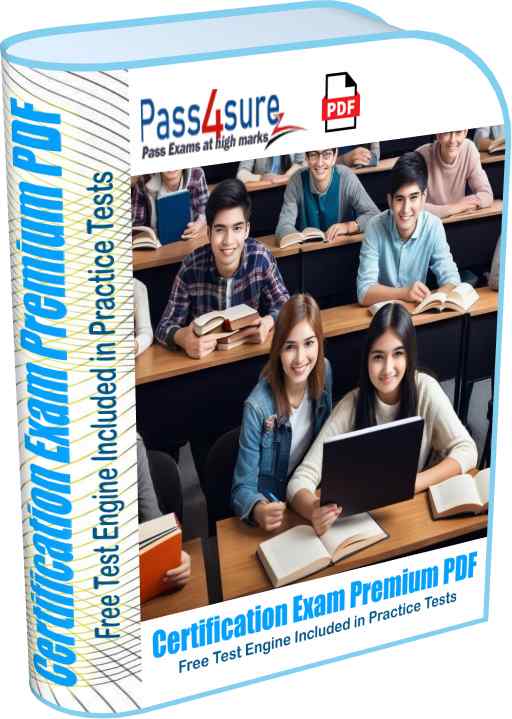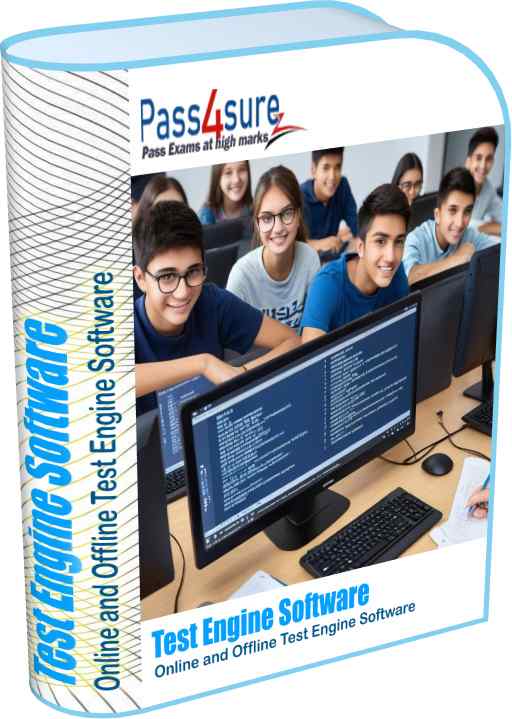| Exam Code | SSCP |
| Questions and Answers | 1076 |
| Premium Access | Yes |
| Online Test Engine | Yes |
| Comprehensive Q&A | Yes |
| Success Rate | 98% |
| Real Questions | Yes |
| Updated Regularly | Yes |
| Portable Files | ✔ |
| Unlimited Download | ✔ |
| 100% Secured | ✔ |
| Confidentiality | 100% |
| Success Guarantee | 100% |
| Any Hidden Cost | $0.00 |
| Auto Recharge | No |
| Updates Intimation | by Email |
| Technical Support | Free |
| PDF Compatibility | Windows, Android, iOS, Linux |
| Test Engine Compatibility | Mac/Windows/Android/iOS/Linux |
| Sample Questions |  |
Pass4sure Practice Tests are an effective way to prepare for the SSCP exam. The practice tests include premium PDF and Test Engine Software. Pass4surez.in provides an extensive question bank to improve your knowledge and help you achieve high marks on the SSCP exam.
The Systems Security Certified Practioner exam questions and answers on Pass4surez.in are regularly verified and updated to ensure they reflect the latest syllabus and topics covered in the real test. The certification exams and entry test exams from pass4surez.com make you familiar with the test environment. The goal is to enhance your knowledge of the SSCP exam and enable you to pass it on your first attempt.
The PDF of SSCP exam questions and answers provided by Pass4surez.in contains a comprehensive pool of questions and verified answers, including references and explanations where applicable. The objective is not only to help you pass the exam, but also to significantly improve your knowledge of the latest SSCP course topics.
 |
|
CERTIFICATION EXAM PREMIUM PDF
Pass4Sure provide premium PDF that contains all the questions and answers that are necessary to make your concepts about the exam topics clear and boost your knowledge about the exam. These questions and answers make you ready to face actual test in test centers. Our team keep on revising material and update the exam questions accordingly. You will feel confident in test center. Our support team keep on helping our customers to make their testing experience best. Our premium PDF files are searchable, convertable and printable at high quality to make book that you can study during traveling or during vacations. Our automated system sends intimation email to our customers on each update. The files in customer download section is overwritten with latest pdf files.
|
| |
|
 |
|
CERTIFICATION EXAM TEST ENGINE
Pass4sure test engine is best certification and examination preparation tool that help you make yourself ready to take the actual exam and get high marks in the exam. Our OTE (Online Test Engine) support all OS Platforms including iOS, Android, Windows, Linux, Chromebook etc and provide up to date experience to get ready for actual test. Our Offline Test Engine is compatible to all windows platforms including latest windows versions. Our test engines helps to familiarize actual test environment and makes you ready to take timed tests. Your performance history and graphs helps you to see when you are ready to sit in actual exam in test center. These test engines uses up to date and latest questions and answers, keeps on updating the questions pool and sends you intimation on each update.
|
Pass4sure Premium PDF and Test Engines support all platforms and devices including mobile devices and computers. You should download sample PDF and Test Engine to evaluate the product before you buy the full version. Our exam samples include some questions that may be or may not be up to date but full version is always up to date.
Exam Title :
ISC2 Systems Security Certified Practitioner (SSCP)
Exam ID :
SSCP
Exam Duration :
180 mins
Questions in Exam :
125
Passing Score :
700/1000
Exam Center :
Pearson VUE
Real Questions :
ISC2 SSCP Real Questions
VCE Practice Test :
ISC2 SSCP Certification VCE Practice Test
Access Controls 16%
Implement and maintain authentication methods
- Single/multifactor authentication
- Single sign-on
- Device authentication
- Federated access
Support internetwork trust architectures
- Trust relationships (e.g., 1-way, 2-way, transitive)
- Extranet
- Third party connections
Participate in the identity management lifecycle
- Authorization
- Proofing
- Provisioning/de-provisioning
- Maintenance
- Entitlement
- Identity and Access Management (IAM) systems
Implement access controls
- Mandatory
- Non-discretionary
- Discretionary
- Role-based
- Attribute-based
- Subject-based
- Object-based
Security Operations and Administration 15%
Comply with codes of ethics
- (ISC)² Code of Ethics
- Organizational code of ethics
Understand security concepts
- Confidentiality
- Integrity
- Availability
- Accountability
- Privacy
- Non-repudiation
- Least privilege
- Separation of duties
Document, implement, and maintain functional security controls
- Deterrent controls
- Preventative controls
- Detective controls
- Corrective controls
- Compensating controls
Participate in asset management
- Lifecycle (hardware, software, and data)
- Hardware inventory
- Software inventory and licensing
- Data storage
Implement security controls and assess compliance
- Technical controls (e.g., session timeout, password aging)
- Physical controls (e.g., mantrap, cameras, locks)
- Administrative controls (e.g., security policies and standards, procedures, baselines)
- Periodic audit and review
Participate in change management
- Execute change management process
- Identify security impact
- Testing /implementing patches, fixes, and updates (e.g., operating system, applications, SDLC)
Participate in security awareness and training
Participate in physical security operations (e.g., data center assessment, badging)
Risk Identification, Monitoring, and Analysis 15%
Understand the risk management process
- Risk visibility and reporting (e.g., risk register, sharing threat intelligence, Common Vulnerability Scoring System (CVSS))
- Risk management concepts (e.g., impact assessments, threat modelling, Business Impact Analysis (BIA))
- Risk management frameworks (e.g., ISO, NIST)
- Risk treatment (e.g., accept, transfer, mitigate, avoid, recast)
Perform security assessment activities
- Participate in security testing
- Interpretation and reporting of scanning and testing results
- Remediation validation
- Audit finding remediation
Operate and maintain monitoring systems (e.g., continuous monitoring)
- Events of interest (e.g., anomalies, intrusions, unauthorized changes, compliance monitoring)
- Logging
- Source systems
- Legal and regulatory concerns (e.g., jurisdiction, limitations, privacy)
Analyze monitoring results
- Security baselines and anomalies
- Visualizations, metrics, and trends (e.g., dashboards, timelines)
- Event data analysis
- Document and communicate findings (e.g., escalation)
Incident Response and Recovery 13%
Support incident lifecycle
- Preparation
- Detection, analysis, and escalation
- Containment
- Eradication
- Recovery
- Lessons learned/implementation of new countermeasure
Understand and support forensic investigations
- Legal and ethical principles
- Evidence handling (e.g., first responder, triage, chain of custody, preservation of scene)
Understand and support Business Continuity Plan (BCP) and Disaster Recovery Plan (DRP) activities
- Emergency response plans and procedures (e.g., information system contingency plan)
- Interim or alternate processing strategies
- Restoration planning
- Backup and redundancy implementation
- Testing and drills
Cryptography 10%
Understand fundamental concepts of cryptography
- Hashing
- Salting
- Symmetric/asymmetric encryption/Elliptic Curve Cryptography (ECC)
- Non-repudiation (e.g., digital signatures/certificates, HMAC, audit trail)
- Encryption algorithms (e.g., AES, RSA)
- Key strength (e.g., 256, 512, 1024, 2048 bit keys)
- Cryptographic attacks, cryptanalysis, and counter measures
Understand reasons and requirements for cryptography
- Confidentiality
- Integrity and authenticity
- Data sensitivity (e.g., PII, intellectual property, PHI)
- Regulatory
Understand and support secure protocols
- Services and protocols (e.g., IPSec, TLS, S/MIME, DKIM)
- Common use cases
- Limitations and vulnerabilities
Understand Public Key Infrastructure (PKI) systems
Fundamental key management concepts (e.g., key rotation, key composition, key creation, exchange, revocation, escrow)
- Web of Trust (WOT) (e.g., PGP, GPG)
Network and Communications Security 16%
Understand and apply fundamental concepts of networking
- OSI and TCP/IP models
- Network topographies (e.g., ring, star, bus, mesh, tree)
- Network relationships (e.g., peer to peer, client server)
- Transmission media types (e.g., fiber, wired, wireless)
- Commonly used ports and protocols
Understand network attacks and countermeasures (e.g., DDoS, man-in-the-middle, DNS poisoning)
Manage network access controls
- Network access control and monitoring (e.g., remediation, quarantine, admission)
- Network access control standards and protocols (e.g., IEEE 802.1X, Radius, TACACS)
- Remote access operation and configuration (e.g., thin client, SSL VPN, IPSec VPN, telework)
Manage network security
- Logical and physical placement of network devices (e.g., inline, passive)
- Segmentation (e.g., physical/logical, data/control plane, VLAN, ACLs)
- Secure device management
Operate and configure network-based security devices
- Firewalls and proxies (e.g., filtering methods)
- Network intrusion detection/prevention systems
- Routers and switches
- Traffic-shaping devices (e.g., WAN optimization, load balancing)
Operate and configure wireless technologies (e.g., bluetooth, NFC, WiFi)
- Transmission security
- Wireless security devices (e.g.,WIPS, WIDS)
Systems and Application Security 15%
Identify and analyze malicious code and activity
- Malware (e.g., rootkits, spyware, scareware, ransomware, trojans, virus, worms, trapdoors, backdoors, and remote access trojans)
- Malicious code countermeasures (e.g., scanners, anti-malware, code signing, sandboxing)
- Malicious activity (e.g., insider threat, data theft, DDoS, botnet)
- Malicious activity countermeasures (e.g., user awareness, system hardening, patching, sandboxing, isolation)
Implement and operate endpoint device security
- HIDS
- Host-based firewalls
- Application white listing
- Endpoint encryption
- Trusted Platform Module (TPM)
- Mobile Device Management (MDM) (e.g., COPE, BYOD)
- Secure browsing (e.g., sandbox)
Operate and configure cloud security
- Deployment models (e.g., public, private, hybrid, community)
- Service models (e.g., IaaS, PaaS and SaaS)
- Virtualization (e.g., hypervisor)
- Legal and regulatory concerns (e.g., privacy, surveillance, data ownership, jurisdiction, eDiscovery)
- Data storage and transmission (e.g., archiving, recovery, resilience)
- Third party/outsourcing requirements (e.g., SLA, data portability, data destruction, auditing)
- Shared responsibility model
Operate and secure virtual environments
- Software-defined networking
- Hypervisor
- Virtual appliances
- Continuity and resilience
- Attacks and countermeasures
- Shared storage
You can download a free PDF of the SSCP practice test and study guide to try before purchasing the premium files. To ace the exam, simply download the SSCP exam questions and answers file, memorize the content, and practice with the VCE Exam Simulator. This will ensure you are fully prepared for the real test.
The SSCP PDF practice test and exam questions and answers can be accessed on any device, including iPhone, iPad, Android, and Windows. You can download the PDF to your computer or any other device and start studying. Additionally, you can download and install the VCE Exam Simulator for further practice. The SSCP PDF is printable in high quality, allowing you to take it with you on vacations or while traveling. Your updated SSCP exam files can be accessed anytime from your online account, and you will receive your login credentials immediately after purchase.


